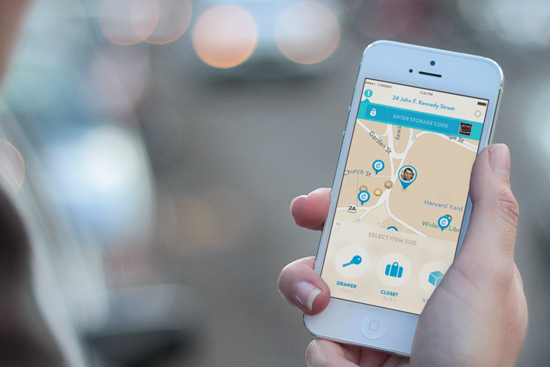How many times have you found yourself checking out of a hotel and carting around your suitcases before an evening flight? Thanks to a new iPhone app called Cubbyhole—designed by a group of Boston University alums—people needing temporary storage for their bags can now find apartment dwellers willing to house their stuff for anywhere from an hour to several months.
“It’s really popular for day travelers or friends of students or students moving out for summer,” says Jason Kaplan (COM’12), Cubbyhole’s chief marketing officer and one of the app’s cofounders. “Our platform helps users find a conveniently located option for storage, as opposed to the storage companies that make students rent a car, drive across the river, and pay insurance and fees.”
Cubbyhole is the brainchild of Nus Sharif (SMG’05), the company’s chief executive officer. An avid user of Airbnb, a website that puts travelers in touch with people willing to rent out their homes, Sharif knew there was a need for a short-term storage option. Many guests who had rented his Boston apartment would ask if they could leave their bags there after checkout so they could explore Boston before catching a late flight.
That resulted in Sharif forming Cubbyhole with friends Kaplan, Philippe Bosshart (COM’12), chief design officer, Selim Nehdi, vice president of new business, and Alex Corrado, chief technology officer.
To use Cubbyhole, users open the app on their iPhone and sign in with their Facebook login. After the app determines their location, they select how much storage room they need (a “drawer,” a “closet,” a “half room,” a “full room”). They then select the drop-off and pickup times and take photos of what they need stored.

Cubbyhole determines users’ location and connects them to nearby storage. Photo courtesy of Cubbyhole
That information is sent to nearby hosts, who have the option of refusing to store anything if they feel uncomfortable about any part of the transaction (e.g., a concern that a package could contain drugs). If a host agrees to provide storage, the app places the two people in touch. The exchange usually takes only a few minutes to complete, says Kaplan.
Prices start at $15 a day (whether storage is needed for an hour or 12), but drop significantly after that. For example, a half room is $7 a day for each additional day, and monthly rates are available. Renters are penalized if they are late picking up their bags.
More than 200 people have downloaded the Cubbyhole app since it debuted in the iTunes store last September. Plans call for making Cubbyhole available as an Android app and a browser app.
The growing business is just one of many popular “share economy”services such as Airbnb, Uber, and Lyft that allow people to make money from things they own (namely homes and cars) by renting them out to people on a temporary basis. Not only does Cubbyhole contribute to the community, Kaplan says, but it is “a great way to supplement rent and make cash.”
Those offering to store luggage keep 70 percent of the fee, with the remaining 30 percent going to Cubbyhole, which must pay taxes and credit card fees, Kaplan says. Payment is made electronically via PayPal.

The Cubbyhole team meets at Trident once a week to discuss the business. Photo by Mike Spencer
There are security measures in place to prevent theft and provide peace of mind for both hosts and users. The first line of defense comes when users log into the app with their Facebook account and enter their credit card information to set up payment. With these two pieces of information, Cubbyhole is able to make sure that people are who they say they are. Each transaction is covered by a $1,000 insurance policy and a guarantee that should a problem arise, Cubbyhole will work with police to try to track down stolen items (Cubbyhole’s insurance policy does not cover cash, collectibles, rare artwork, or jewelry). The company also provides a 24-hour hotline staffed by board members should a user run into a problem.
But ultimately, “it’s up to the host to determine whether or not they want to store something,” Kaplan says. “We don’t penalize or charge a cancellation fee if a user feels unsafe.” Like other share economy sites, Cubbyhole relies on user reviews to rate its community members. If users receive three negative reviews, they are removed.
Kaplan got the chance to try the app firsthand a few weeks ago when he hosted friends from New York. The plan was to meet them at South Station and show them the Fort Point area. Realizing their bulky bags would make that impossible, Kaplan called up the app, since taking the T to his place near BU’s West Campus and back would take too long. He says that “within a few minutes I was connected to a Cubbyhole user who lived in the area.” They were able to drop off the bags and reclaim them after dinner, paying only $15.
“We didn’t have the hassle of dragging around the bags or worrying about going home first to drop everything off,” Kaplan says.















































Related Stories
New BU Today Mobile App Available Now
Latest version is optimized for speed and presentation
What’s for Dinner?
Students’ BU Food app brings dining halls to 21st century
Finding Love on Comm Ave
Photo essay celebrates some of the many BU couples who have said “I do”
Post Your Comment